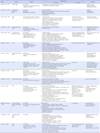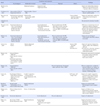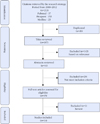1. Badger T, Segrin C, Meek P, Lopez AM, Bonham E. A case study of telephone interpersonal counseling for women with breast cancer and their partners. Oncol Nurs Forum. 2004; 31:997–1003.

2. Baik OM, Lim JW. Social support in Korean breast and gynecological cancer survivors: Comparison by the cancer stage at diagnosis and the stage of cancer survivorship. Korean J Fam Soc Work. 2011; 32(6):5–35.
3. Baucom DH, Porter LS, Kirby JS, Gremore TM, Wiesenthal N, Aldridge W, et al. A couple-based intervention for female breast cancer. Psychooncology. 2009; 18:276–283.
http://dx.doi.org/10.1002/pon.1395.

4. Belcher AJ, Laurenceau JP, Graber EC, Cohen LH, Dasch KB, Siegel SD. Daily support in couples coping with early stage breast cancer: Maintaining intimacy during adversity. Health Psychol. 2011; 30:665–673.
http://dx.doi.org/10.1037/a0024705.

6. Budin WC, Hoskins CN, Haber J, Sherman DW, Maislin G, Cater JR, et al. Breast cancer: Education, counseling, and adjustment among patients and partners: A randomized clinical trial. Nurs Res. 2008; 57:199–213.
http://dx.doi.org/10.1097/01.NNR.0000319496.67369.37.
7. Bultz BD, Speca M, Brasher PM, Geggie PH, Page SA. A randomized controlled trial of a brief psychoeducational support group for partners of early stage breast cancer patients. Psychooncology. 2000; 9:303–313.

8. Cho EA, Oh HE. Effects of laughter therapy on depression, quality of life, resilience and immune response in breast cancer survivors. J Korean Acad Nurs. 2011; 41:285–293.
http://dw.doi.org/10.4040/jkan.2011.41.3.285.
9. Choi EH, Chung BY, Kim GD, Kim KH, Byun HS. Literature review of cognitive developmental interventions on patients with breast cancer undergoing chemotherapy. J Korean Oncol Nurs. 2011; 11:26–32.
http://dx.doi.org/10.5388/jkon.2011.11.1.26.

10. Choi KS, Kim MS, Lee IJ, Han SY, Park JA, Lee JH. Analysis of nursing intervention studies on patients with breast cancer in Korea. J Korean Oncol Nurs. 2011; 11:74–82.
http://dx.doi.org/10.5388/jkon.2011.11.1.74.

11. Cochrane BB, Lewis FM. Partner's adjustment to breast cancer: A critical analysis of intervention studies. Health Psychol. 2005; 24:327–332.

12. Cochrane BB, Lewis FM, Griffith KA. Exploring a diffusion of benefit: Does a woman with breast cancer derive benefit from an intervention delivered to her partner? Oncol Nurs Forum. 2011; 38:207–214.
http://dx.doi.org/10.1188/11.ONF.207-214.

13. Garland SN, Carlson LE, Marr H, Simpson S. Recruitment and retention of palliative cancer patients and their partners participating in a longitudinal evaluation of a psychosocial retreat program. Palliat Support Care. 2009; 7:49–56.
http://dx.doi.org/10.1017/S1478951509000078.

14. Hoskins CN, Haber J, Budin WC, Cartwright-Alcarese F, Kowalski MO, Panke J, et al. Breast cancer: Education, counseling, and adjustment-a pilot study. Psychol Rep. 2001; 89:677–704.

15. Jang EH, Choi KS, Kwon SJ. A meta-analysis of intervention on depression in cancer patients. Asian Oncol Nurs. 2013; 13:1–10.

17. Jun EY. Effect of a sexual life reframing program on marital intimacy, body image and sexual function among breast cancer survivors. Seoul: Yonsei University;2008. Unpublished Doctoral Dissertation.
18. Kim JN. Efficacy of an integrated group psychotherapy on the quality of life and immune function in breast cancer patients. Seoul: Korea University;2005. Unpublished Doctoral Dissertation.
19. Kim JE, Park KM, Koh HJ. The effect of mastectomy education for women with mastectomy and supporting education for their spouses on the quality of life of the women. J Korean Soc Matern Child Health. 2003; 7:233–242.
20. Lewis FM, Cochrane BB, Fletcher KA, Zahlis EH, Shands ME, Gralow JR, et al. Helping her heal: A pilot study of an educational counseling intervention for spouses of women with breast cancer. Psychooncology. 2008; 17:131–137.

21. Manne SL, Ostroff JS, Winkel G, Fox K, Grana G, Miller E, et al. Couple-focused group intervention for women with early stage breast cancer. J Consult Clin Psychol. 2005; 73:634–646.

22. Manne S, Ostroff JS, Winkel G. Social-cognitive processes as moderators of a couple-focused group intervention for women with early stage breast cancer. Health Psychol. 2007; 26:735–744.

23. Matsuda A, Yamaoka K, Tango T, Matsuda T, Nishimoto H. Effectiveness of psychoeducational support on quality of life in early-stage breast cancer patients: A systematic review and meta-analysis of randomized controlled trials. Qual Life Res. 2013; Manuscript submitted for publication.

25. Rim HS. Meta-analysis on the effect of nursing intervention in patients with breast cancer. Seoul: Korea University;2007. Unpublished master thesis.
26. Scott JL, Halford WK, Ward BG. United we stand? The effect of a couple-coping intervention on adjustment to early stage breast or gynecological cancer. J Consult Clin Psychol. 2004; 72:1122–1135.
27. Sherman DW, Haber J, Hoskins CN, Budin WC, Maislin G, Cater J, et al. Differences in physical, emotional, and social adjustment of intimate, family, and nonfamily patient-partner dyads based on a breast cancer intervention study. Oncol Nurs Forum. 2009; 36:E185–E197.
http://dx.doi.org/10.1188/09.ONF.E185-E197.

28. Shields CG, Rousseau SJ. A pilot study of an intervention for breast cancer survivors and their spouses. Fam Process. 2004; 43:95–107.

29. The Korea Central Cancer Registry. National cancer registration & statistics 2009. Seoul: National Cancer Center & Ministry of Health & Welfare;2011.
30. Von Ah D, Kang DH, Carpenter JS. Stress, optimism, and social support: Impact on immune responses in breast cancer. Res Nurs Health. 2007; 30:72–83.







 PDF
PDF ePub
ePub Citation
Citation Print
Print



 XML Download
XML Download